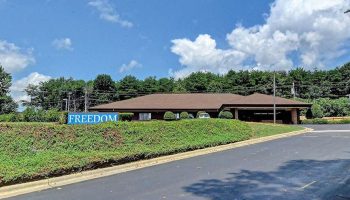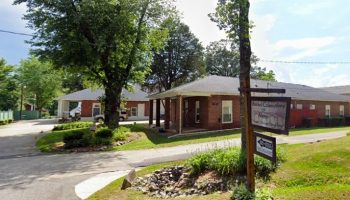About Daymark Recovery Services Forsyth NW Center
In the heart of Winston Salem, North Carolina, is the behavioral health and drug recovery facility, Daymark Recovery Services Forsyth Center. They’re right off the John Gold Memorial Expressway. This center provides both adult and adolescent services, helping individuals receive comprehensive care for their mental health or substance use struggles.
This is an outpatient clinic and you’ll find services here including walk in assessments, group counseling sessions, and a well-structured intensive outpatient program.
The facility itself is somewhat dated, and while there is a clinical feel to it, you can expect to receive quality care that meets the latest recovery standards. You’ll also be working with an integrative team of mental and medical healthcare professionals.
The facility sits right In the middle of downtown Winston Salem, and it’s close to other community and government agencies for convenient access if you need social services support. If you’re looking to unwind and maybe exercise, Bailey Park and the Bethlehem Community Center aren’t too far away.
Among these services are psychiatric medication management, and medication assisted treatment (MAT) using Suboxone. Integrating meditation into your recovery plan can help you focus on cognitive behavioral therapies and other counseling services you might be receiving.
These evidence-based supports extend to adolescents as well. However, there’s more flexibility in how children receive care. For example, there are intensive home services and a mobile crisis unit can deploy to your child’s home or school if they need emergency care.
Through this nonprofit organization, you can get connected to other services that are tailored to your unique recovery needs. For example, their intensive in home program might work best for adolescents who might also be facing social anxieties and are unable to leave home.
As a larger network with clinics throughout the region, you can also get connected to more intensive support like residential care if you need it as well.
Levels of Care
-
Inpatient
Inpatient and residential programs provide round-the-clock medical and emotional support as you live at the treatment facility. This level of care may be recommended if you have severe addictions or mental health conditions since it removes outside distractions and allows you to focus solely on therapy.
-
Outpatient
In outpatient therapy, you’ll attend therapy sessions several times each week while living at home. This is ideal if you have a strong support system and a lower risk of relapse. Outpatient treatment offers flexibility to maintain work, school or family obligations.
-
Aftercare
Aftercare programs provide ongoing support after you complete a rehab program. They may include several components to help you maintain sobriety including therapy, community support groups and relapse prevention strategies. This gives you a network of resources as you reintegrate into your daily life.
-
Dual Diagnosis
Dual diagnosis programs address substance use disorders and co-occurring mental health conditions simultaneously. This integrated approach to care improves the likelihood of long term recovery and stability by addressing the root causes of addiction.
-
Intervention
An intervention is a structured and professionally guided conversation with an individual who is struggling with addiction. During the conversation, family and friends will encourage you to seek treatment. This is often a pivotal step for those resistant to getting help.
Detox Service Setting
-
Inpatient Detox
Inpatient detox occurs in a dedicated treatment facility. You’ll live there around the clock and receive intensive medical support and supervision to help manage your withdrawal symptoms. It is suitable for individuals with moderate to severe addictions as it ensures a stable detox environment.
-
Outpatient Detox
Outpatient detox gives you access to medically supervised withdrawal services while still allowing you to live at home. You’ll attend a clinic for treatment and monitoring. This flexible option is suitable for those with mild to moderate withdrawal symptoms who have strong support systems.
Programs
-
Adult (18+)
Adult programs address the substance use and life challenges specific to adults. Therapists can deliver sessions in individual, group and family settings. Services often include job support and life skills training in a structured environment.
-
Alcohol Detox
Alcohol detox programs offer medical support to help individuals withdraw safely from alcohol. Your care team may use medications to ease your symptoms and provide medical monitoring to address complications.
-
Cognitive Behavioral Therapy
Cognitive behavioral therapy focuses on changing harmful thought patterns and behaviors associated with addiction. You’ll learn healthier coping mechanisms by identifying and replacing negative thoughts. This improves your emotional resilience and decreases your relapse potential.
-
Drug Detox
Drug detox programs support individuals who are withdrawing from addictive substances like cocaine and heroin. Medical support helps you manage symptoms in a controlled and safe environment so you can achieve initial sobriety.
-
Men
Men's programs address substance use while also considering the social pressures, family roles and mental health concerns that are specific to men. You’ll learn healthy coping mechanisms as you build emotional resilience and develop communication skills.
-
Opioid Detox
Opioid detox uses medications to ease severe withdrawal symptoms. It also includes medical supervision to help you manage potential complications. These services allow you to stabilize and begin a recovery plan.
-
Seniors (65+)
Senior programs address the unique needs of older adults like chronic pain, grief and isolation. Programs include peer support and medical oversight for age related health concerns. The goal is to improve quality of life and promote sober aging.
-
Women
Women's programs offer a safe and supportive space to focus on gender specific issues such as trauma, family roles and mental health conditions. Therapists tailor the sessions to address women's needs and foster empowerment in a healing and nurturing environment.
-
Young Adult (18 - 25)
Young adult programs are designed for individuals who are transitioning into adulthood. Topics of discussion typically include identity, independence and peer relationships. Providers may also offer life skills training and career support.
Payment Options
- Medicaid
- Military Insurance
- Private Insurance
- Self Pay
Accreditations
-
 CARF
CARF
Contact
650 North Highland Avenue
Suite 110
Winston-Salem, NC 27101




